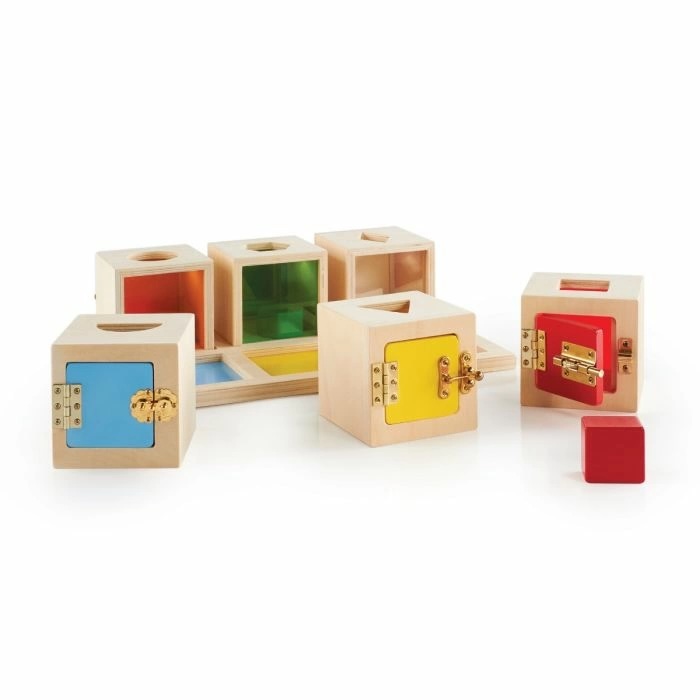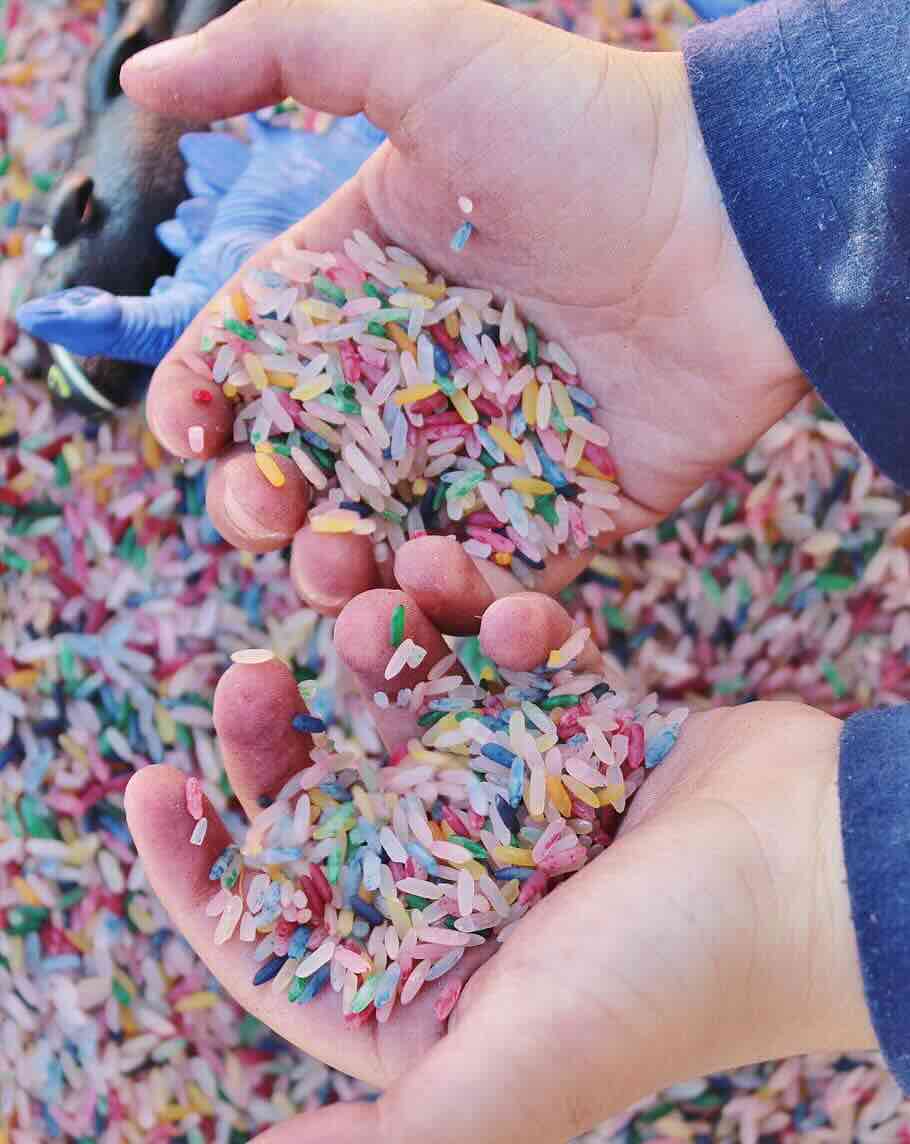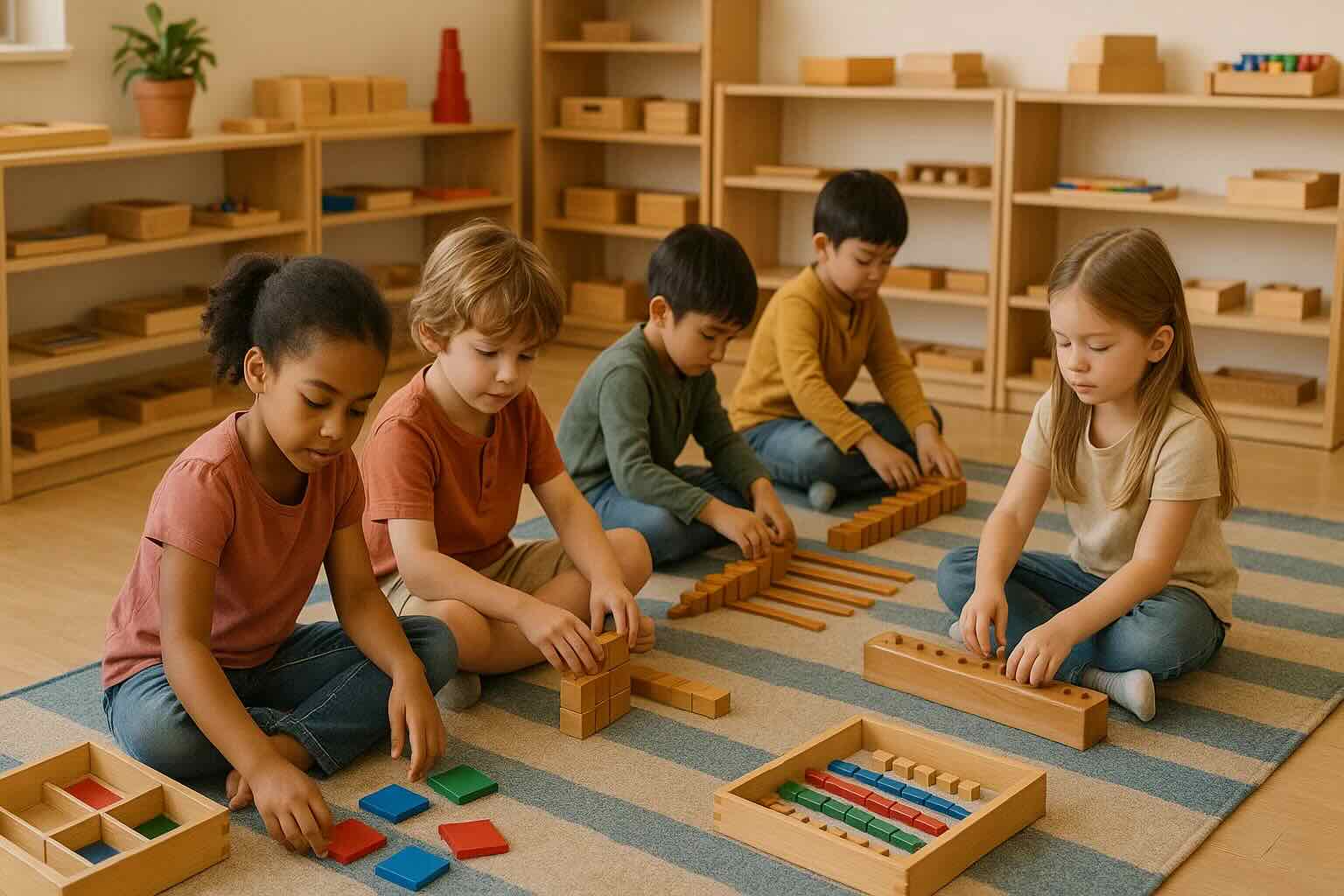💡 TL;DR – How to Ask for Montessori Parenting Support Online:
- Use "I" statements to invite empathy instead of judgment.
- Describe your efforts before asking for help—show you’ve tried.
- Ask for real examples from other Montessori parents.
- Avoid shaming language like “I know this isn’t very Montessori…”
- Respond to judgment with curiosity and grace, not defensiveness.
- Join groups that reflect authentic Montessori values like empathy and growth.
How to Ask for Help in Montessori Parenting Groups (Without Getting Judged)
There is nothing more important in the world than our children. We always want what is best for them. Everyone wants to appear as if they are confident in every choice they are making for their children. With this in mind, seeking Montessori parenting support can feel intimidating. Especially when you're worried about judgment from more experienced parents. Many of us hesitate to ask questions in Montessori communities for fear of appearing uninformed or not "Montessori enough." But here's the truth: every Montessori parent started somewhere, and building a supportive community is essential for your parenting journey. Don’t allow people with strong personalities to keep you from finding the best route for your child to follow. This guide will help you navigate Montessori groups with confidence. You will be able to ask for the support you need and connect with others in a meaningful way.
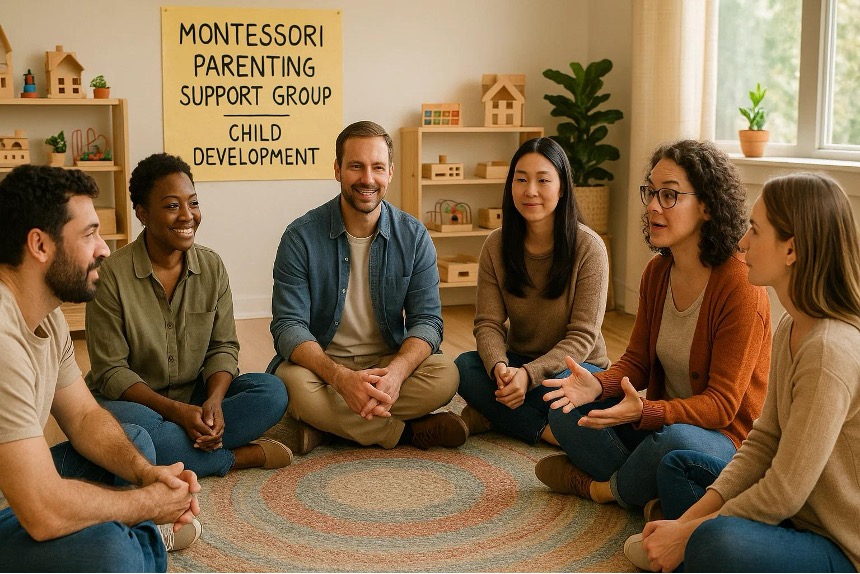
💬 Feeling nervous about posting in Montessori groups? That’s normal. Use this guide as your roadmap, and trust that authentic Montessori communities value empathy and learning.
Understanding Montessori Education's Values: Community and Non-Judgment
With all the choices available today, choosing Montessori for your child is monumental. You want to make sure your child can excel and grow in this atmosphere. Before diving into how to ask for help, it's important to understand that collaboration and non-judgmental attitudes are core to Montessori philosophy. Maria Montessori herself emphasized the importance of community in child development and learning. This philosophy extends to parenting communities as well. This is not simply a place to send a child for several hours per day, this is a choice to change your lifestyle as well as growing with the education of your child.
"The child is both a hope and a promise for mankind." - Maria Montessori
This philosophy reminds us that we're all learning together in service of our children's development. I grew up in the 60’s and was not involved with preschool, kindergarten, or any input from outside my home until I entered first grade. My father had an 8th grade education and worked in a factory; mother was a housewife with the same education. I was the third of four children in a very small household. They did the best they could at that time. However, I have always felt that I was behind the other children because I had no social skills or set patterns of behavior. Being involved in your child’s early life is critical for giving them a basis for learning and belonging.
Authentic Montessori parenting support groups understand that:
- Every child develops at their own pace, and so does every parent's journey
- Questions come from a place of love and desire to improve
- Sharing experiences benefits the entire community
- Judgment hinders growth and contradicts Montessori principles of respect
I remember my mother telling me as a child that “Teaching is for teachers.” I had very limited input other than perhaps a set of ABC building blocks. It was not in their mindset or in the time spread between four children to nurture each child as a separate human being. For the children that are fortunate enough to be a part of the Montessori program, seeking support aligns perfectly with Montessori values of continuous learning and growth. Just as we create prepared environments for our children to learn independently, we too need supportive environments to develop as parents.
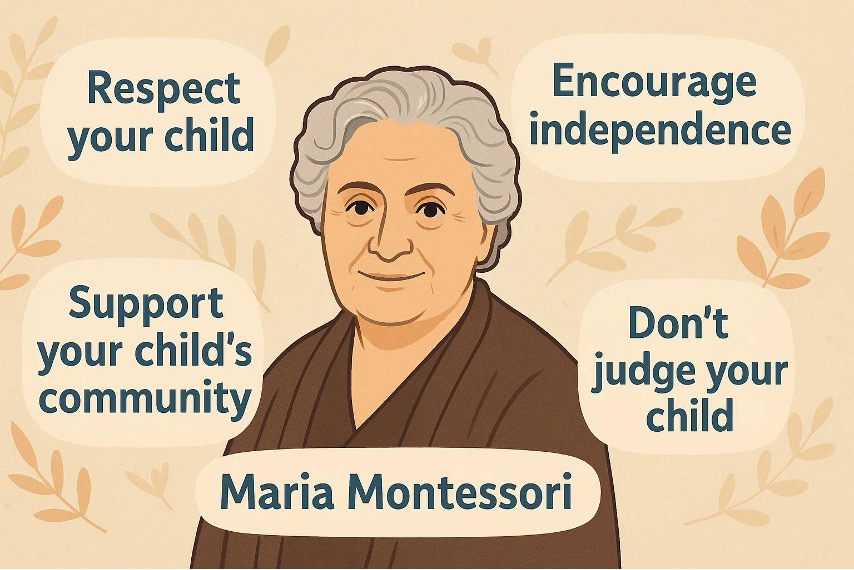
Practical Tips for Asking for Help in Montessori Communities
When seeking Montessori parenting support, how you frame your questions can make a significant difference in the responses you receive. Having an open mind and an open heart can help a parent to remember this program is for their child. Personal conflicts that can arise between parents can harm the balance of the community. Here are practical strategies to help you ask for support effectively:
Use "I" Statements to Frame Your Questions
Effective Approaches:
- "I'm struggling with implementing practical life activities at home..."
- "I've noticed my child seems frustrated with the materials I've provided..."
- "I'm trying to understand how to better support independence during mealtime..."
Less Effective Approaches:
- "What's the right way to set up a Montessori bedroom?"
- "Why isn't my child interested in the activities?"
- "Does anyone else's child make such a mess at mealtime?"
"I" statements show ownership of your parenting journey and create space for diverse perspectives rather than seeking a single "correct" answer. It softens the conversation and allows the other person to share a meaningful suggestion without indicating there is a problem with the way you are using the program and materials.
Acknowledge Your Efforts to Align with Montessori Method
When seeking Montessori parenting support, briefly mention the steps you've already taken. This can save a considerable amount of time by passing over the most common answers to get the result you need. This demonstrates your commitment and helps others provide more targeted advice:
"I've been trying to follow Montessori principles of independence by setting up a self-serve snack station but my 3-year-old seems overwhelmed by the choices."I've reduced options to two, but I'm wondering if there are other approaches that might help. I'm also considering whether introducing more structured tools — like some of these Montessori toys for 3-year-olds that promote choice and independence — might offer a clearer starting point for him."
This approach shows you've done your homework while still being open to learning more. Perhaps a reminder that each 3-year-old will be unique, but at the same time may have certain tendencies that other parents have encountered. Asking questions in this fashion helps the other parents to recognize that your child is the one of the most important people in your life at that you are striving to make sure they have the best childhood possible.
📃 Pro Tip: When sharing what you’ve already tried, add your child’s age and how they responded. This helps others give you more tailored advice.
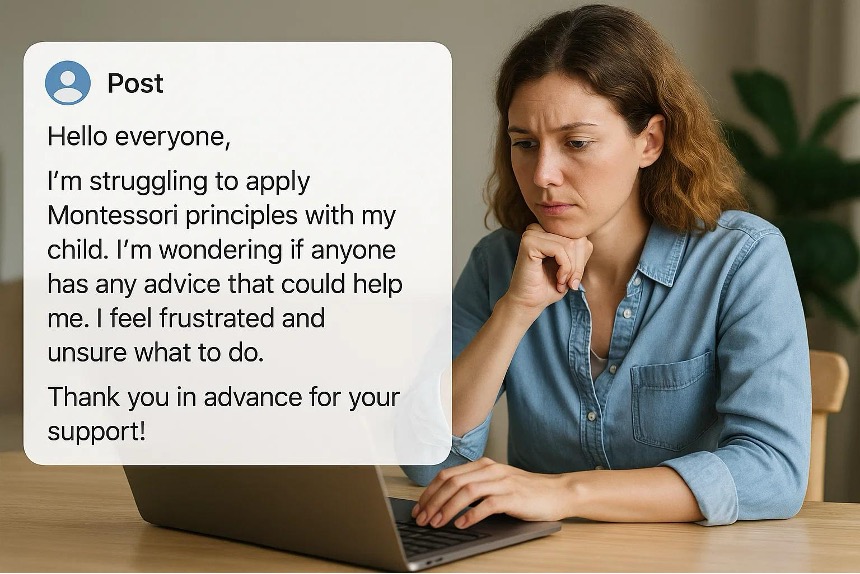
Ask for Specific Examples or Experiences as a Montessori Parent
- Rather than asking for abstract advice, request concrete examples that have worked for other parents:
"Could anyone share how they've successfully introduced food preparation activities for a 2-year-old?" - "I'd love to hear examples of how you've handled resistance to clean-up time while honoring Montessori principles."
- "Has anyone found specific language that helps with setting boundaries during independent work time?"
Asking for real experiences invites conversation rather than judgment and gives you practical ideas to adapt to your unique situation. Successful Montessori parents should feel comfortable and open about their experiences and how to work though each level as your child progresses. I wish with all my heart that my parents had looked at me as a 2-year-old and realized that I had potential even at that early age to be engaged in learning activities.
Helpful Phrases to Use (and Phrases to Avoid)
As with all things in life it is better to remember that questions should be posed when you are calm. Trying to have a conversation when you are stressed out or frustrated can cause the conversation to become enraged. The language and tone you use when seeking Montessori parenting support can significantly impact the responses you receive.
Here are some effective phrases to use and others to avoid:
Phrases That Invite Support on Parenting Style
- "How do you handle [issue] while staying true to Montessori values?"
- "I'm curious about different approaches to [challenge] that respect the child's independence."
- "What has worked in your experience when [situation occurs]?"
- "I'd appreciate hearing different perspectives on [topic]."
- "Could you share how you've adapted [principle] for your unique child?"
Developing respectful language habits at home often begins with how we frame daily routines. Simple tools like circle time rugs that support conversation can help children learn when to listen and when to speak, reinforcing respectful interactions from a young age.
🗣 Helpful Reminder: Montessori values extend to how we speak. Model respectful, specific language—and you’ll encourage the same in return.
Phrases That May Invite Judgment
- "I know this isn't very Montessori, but..."
- "Am I a bad Montessori parent if I...?"
- "I'm probably doing this all wrong..."
- "What's the correct Montessori way to...?"
- "I don't have time/money/patience for the proper Montessori approach..."
Always remember that your child is the most important person being represented. It may be easy sometimes to feel berated by more knowledgeable people, this is not the case. People who believe in the Montessori way will be willing to help without trying to make you feel inadequate. Find the right people and keep them in your community.
Scripts for Common Situations
When your child resists Montessori materials:
"I've noticed my 3-year-old shows little interest in the pouring activities I've prepared. I've tried demonstrating and inviting participation at different times of day. Has anyone experienced something similar, and what approaches helped you honor your child's development while encouraging engagement?"
When balancing Montessori with other family needs:
"I'm working to create a more Montessori-aligned environment at home while managing the needs of older siblings who are used to different approaches. I'd love to hear how others have navigated this transition in a way that respects everyone in the family."
When seeking alternatives to conventional discipline:
"I'm trying to move away from time-outs toward more respectful approaches to helping my child regulate strong emotions. Could those who've made this shift share specific language or techniques that have been effective in your home?"
Navigating Judgment: Responding with Grace
Despite your best efforts, you may occasionally encounter judgment when seeking Montessori parenting support. Here's how to respond gracefully and maintain your confidence:
Recognize the Difference Between Judgment and Direct Communication
Sometimes what feels like judgment may actually be direct communication or cultural differences in expression. Remember to be calm when asking for advice about a specific difficulty. Take a moment to absorb what the other person is trying to relay to you. Don’t take constructive criticism to mean you are a bad parent or are incapable of utilizing the Montessori principles in your home.
Before responding defensively, consider whether the comment contains useful information delivered in a straightforward manner. If emotional regulation is tough for your child during transitions, creating a calm corner using something like a Montessori reading nook may help support regulation without punishment.

Respond with Curiosity Rather Than Defensiveness
If someone offers criticism of your approach, try responding with curiosity:
"That's an interesting perspective. Could you share more about how that approach has worked in your experience?"
This response acknowledges their input while inviting them to share from experience rather than theory, often softening judgment. Sometimes just giving a little nudge can help them explain how their choices were successful without bragging or putting you down.
Practice Self-Compassion
Remember that Montessori parenting is a journey, not a destination. When you encounter judgment, try these self-compassion practices:
- Remind yourself that you're seeking support because you care deeply about your child's development
- Acknowledge that every parent and child relationship is unique
- Recognize that even Maria Montessori continued learning and evolving her approach throughout her life
- Connect with supportive community members who understand the challenges of the journey and are willing to share positive suggestions
Remember: The most "Montessori" thing you can do is to observe your unique child, respond to their needs, observe how using these techniques are affecting the entire family, and continue learning. This is exactly what you're doing by seeking support!
🤝 Quick Reflection: Every experienced Montessori parent once asked their first question. Your voice might be the one that helps someone else feel welcome tomorrow.
Real-Life Success Stories: Finding Support in Montessori Communities
Many parents have successfully navigated the journey of seeking Montessori parenting support. Here are some anonymized examples that demonstrate how asking for help can lead to meaningful connections and solutions:
From Intimidation to Belonging
"When I first joined a Montessori parenting group, I was intimidated by parents who seemed to have perfect Montessori homes. I finally gathered courage to post about my struggles with implementing practical life activities in our small apartment. The responses were overwhelmingly supportive, with many parents sharing creative solutions for space constraints. One parent even became a mentor to me, and we now meet regularly to exchange ideas."
- Parent of a 3-year-old

Finding Middle Ground
"I was struggling to balance Montessori principles with my partner who preferred more conventional parenting approaches. I posted in a group asking how others navigated these differences. Instead of judgment, I received thoughtful responses from parents in similar situations. They shared how they found compromise while staying true to core Montessori values. Their suggestions helped us create a harmonious approach that worked for our whole family."
- Parent of twins
Adapting for Special Needs
"When my child was diagnosed with sensory processing differences, I worried about how to adapt Montessori principles to meet their needs. I asked my local Montessori community for guidance, being very specific about our challenges. Not only did I receive practical suggestions, but I was also connected with three other families navigating similar circumstances. We now have our own support subgroup where we share resources and celebrate our children's unique journeys."
- Parent of a 4-year-old
These stories highlight how vulnerability in asking for Montessori parenting support often leads to deeper connections and more personalized solutions than you might find through general research alone. Building these relationships can lead to lifetime friendships.
🚀 Action Step: Choose one group from the list below and introduce yourself with a thoughtful post. You don’t need to ask a question yet—just say hi!
Conclusion: Building Your Montessori Support Network
Seeking Montessori parenting support is not a sign of weakness but a demonstration of your commitment to growth and learning—values at the very heart of Montessori philosophy. By approaching communities with authenticity, specific questions, and an openness to diverse perspectives, you can build a supportive network that enhances your parenting journey.
Remember that every parent in these communities was once a beginner. Many of the most helpful members are those who vividly remember their own early questions and challenges. Every group of people will contain people with different personality styles and backgrounds. Finding people with your basic personality can open the door to friendships and make the process of asking questions easier. Your willingness to ask for help not only benefits your family but also strengthens the entire Montessori community.

As you continue your Montessori parenting journey, remember that asking questions today helps you provide better support for your child tomorrow. The courage to seek help models for your child the very qualities we hope to nurture — curiosity, growth mindset, and community connection. Browse our curated selection of Montessori toys and tools to support their growth at every stage. Our children are the most important natural resources our country produces. Our children will be growing up in a fast-paced world that will have many expectations we never encountered. Being a part of the Montessori community hopefully will teach your child to be open to you when they encounter troubles or need advice. They will understand there is a group of people that have been a part of their life since infancy that they can rely on to offer suggestions during the process of becoming a responsible adult in our society.
As you grow remember you will become the person others will rely on to answer their questions. Take the time to be respectful and reflect on your own journey to help them be successful in their journey.
Which Montessori Parenting Support Is Right for You?
Joining the right community can make all the difference in your Montessori journey. Whether you’re just starting out or looking for support during a tricky phase, these online communities offer connection, inspiration, and guidance:
👶 For Parents of Toddlers (0–3 Years)
- Montessori at Home (0 to 3 years) – A friendly Facebook group for caregivers implementing Montessori with infants and toddlers.
🎓 For Preschoolers & Kindergarten-Aged Children (3–6 Years)
- Montessori at Home 3–6 Years – A great space for parents working with children in the early childhood range.
- Montessori at Home – A large and active group sharing activities and questions for all early years.
🌐 For Parents, Educators, and Montessori Enthusiasts
- Montessori Community for Teachers & Parents (0–6 Years) – An inclusive group where both teachers and parents share insights.
- r/Montessori on Reddit – A forum-based space for open Q&A and Montessori discussions.
📢 Pro Tip: When joining a new group, start by reading pinned posts and using the search bar to see if your question has been asked before. This helps you get up to speed and builds goodwill in the community.
Frequently Asked Questions About Montessori Parenting Support
How can I ask questions in a Montessori parenting group without being judged?
Use “I” statements to frame your question from a place of experience and curiosity. For example, say “I’m struggling with introducing practical life activities at home” instead of “What’s the right Montessori way?” This invites empathy and shows you're open to learning.
What’s the best way to get helpful Montessori parenting advice online?
Be specific and mention what you’ve already tried. Include your child’s age and the Montessori principle you're applying. The more detailed you are, the more helpful and personalized responses you'll receive.
How do I deal with judgment in Montessori communities?
Respond with curiosity instead of defensiveness. Ask follow-up questions like “How has that worked for you?” to shift the tone toward collaboration and understanding. Stay grounded in Montessori’s emphasis on mutual respect and personal growth.
What are some phrases I should avoid in Montessori parenting discussions?
Avoid language that invites shame or disqualifies yourself, such as “I’m probably doing this all wrong.” Instead, show openness and humility by asking “How have others approached this with their child?”
Why is asking for help an important part of Montessori parenting?
Asking for help reflects a growth mindset—one of the core Montessori values. It models healthy learning behavior for your child and strengthens the overall community through shared experience and support.





